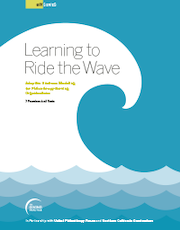Publication Date: January, 2008
Sample board committee descriptions, including roles and responsibilities of committee members
Publication Date: August, 2012
Publication Date: April, 2013
Publication Date: June, 2017
CNJG's Storify content from their Signature Events.
Publication Date: April, 2025
... funder briefing webinar series welcomed New Jersey-based grantmakers along with national funders and provided an opportunity for grantmakers to hear from a wide range of nonprofit experts. ...
Publication Date: September, 2019
... with United Philanthropy Forum and Northern California Grantmakers, this guide shares seven practices and 12 tools ...
On this webinar, the conversation focused on the local news landscape with guests from Chalkbeat Newark, WBGO, and ... , Newark Philanthropic Liaison, CNJG Catherine Wilson , President and CEO, United Way of Greater Newark Cost : Free for CNJG ...
Publication Date: November, 2013
A key objective of the Scaling What Works initiative has been to translate insight and learning from grantmaker intermediaries involved with the Social Innovation Fund and share them with the broader philanthropic community. The fifth guide in the Lessons Learned series presents the benefits and challenges of partnerships between local and national funders, and highlights key considerations for both kinds of funders to foster success in their collaboration.
... Jersey CNJG launched a weekly conference call series for grantmakers to hear from policymakers, disaster ... and colleagues who have been through similar catastrophes. Grantmakers heard from nearly 70 guest speakers including ... officials addressing the many needs of our communities. Grantmakers learned about issues related to both disasters in ...
... the Impala platform that will launch in New Jersey for all grantmakers and all nonprofits. During this workshop, we will showcase the Impala for Grantmakers product which can help you: Conduct due diligence ...
... for the long-term. We will be joined by Catherine Wilson, President and CEO of the United Way of Greater Newark, who will discuss the ... meeting. Cost : Free for CNJG Members; $75 for Non Member Grantmakers Newark Funder Affinity Group: Building Financial ...
These news articles show our members responses to philanthropy's ... & Johnson: A Message from Johnson & Johnson Chairman and CEO Alex Gorsky About Recent Events in the United States ... TD Bank: A statement on recent events from Bharat Masrani, President & CEO, TD Bank Group United Way of Ocean and ...
Publication Date: February, 2013
This paper explores community democracy as a cultural choice and a potential organizing system for philanthropy using stories that demonstrate its principles and practices, primarily growing from the experience of northern California communities. This experience offers a framework of principles and a beginning set of conclusions about how philanthropy can develop productive partnerships from the perspective of a place-based, community democracy.
... how the social sector can advance systems change. Grantmakers and nonprofits grapple with complex, structural ...
... govern your use of the Council of New Jersey Grantmakers website and constitutes an agreement between you ... all information, Knowledgebase, documents, communications, files, text, graphics, software, and products available ... of, goods and services provided by others to whose sites we link. A link to another Web site does not constitute ...
... know that last week Council of New Jersey Grantmakers’ President and CEO Nina Stack, notified the Council’s Board of Trustees ... state of Rhode Island. This is certainly bittersweet news. While we will miss her tremendous leadership, ...
... 333 Davidson Ave, Somerset, NJ The Council of New Jersey Grantmakers is pleased to present our 2023 Conference for the ... Better , a partnership between the Council of New Jersey Grantmakers and the New Jersey Center for Nonprofits . This ...
... with family and friends. July 4 was also the day that President Trump signed the One Big Beautiful Bill, a massive ... civic engagement. We explored key areas like local news, participatory budgeting, guaranteed income, and ... New Jersey. Warmly, Theresa Jacks , President and CEO Council of New Jersey Grantmakers Summer Happenings ...
... how much money is being awarded and where. This tool helps grantmakers make informed decisions and helps to eliminate ...
... of trust in government, and culture wars. Robert Morrison, CEO, Quadrant Research, will address the federal government's ... New Jersey's education system. Moderated by Brandon McCoy, President and CEO, Fund for New Jersey, this discussion will ... more. Cost : Free for CNJG Members; $75 for Non Member Grantmakers This program is only open to staff and trustees ...

